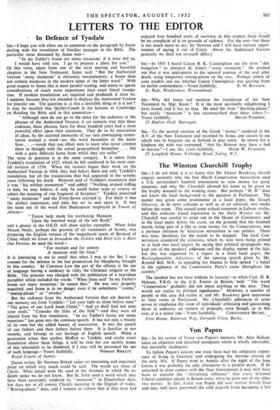LETTERS TO THE EDITOR
- In Defence of Tyndale
Sm,-1 hope you will allow me to comment on the paragraph by Janus dealing with the translation of familiar passages in the Bible. The particular verse discussed by Janus was- " In my Father's house are many mansions: if it were not so, I would have told you. I go to prepare a place for you
Of this verse, taken from one of the most moving and beautiful chapters in the New Testament, Janus said: " But the Authorised Version many mansions' is obviously unsatisfactory: a house does not contain mansions in the modern sense of the latter word." With great respect to Janus this is most painful reading, and seems to ignore considerations of much more importance than exact literal transla- tion. If modern translations are required and produced, it must be, I suppose, because they'are intended to displace the Authorised Version for popular use. The question is: is this a desirable thing or is it not ? It may be recalled that Quiller-Couch in his lectures at Cambridge on Reading the Bible said in this connection-
" Although men do not go to the stake for the cadences or the phrases of the Authorised Version, it yet -remains true that these cadences, these phrases, have for three hundred years had a most • powerful effect upon their emotions. They do so by association of ideas, by the accreted memories of our race enwrapping conno- tation around a word—say the word Jerusalem or the name Sion . . .—words that can affect men to tears who never connect them in thought with the actual geographical Jerusalem . . . but • with a quite different home from which they are exiles."
The verse in question is in the same categcory. It is taken from Tyndale's translation of 1525, which he left unaltered in his most care- ful revision of 1534. When the revisers began their work on the Authorised Version in 1604, they had before them not only Tyndale's translation, but all the translations that had appeared in the seventy years following his death. Westcott said of Tyndale's translation that it was " his noblest monument" and added: " Nothing seemed trifling to him, we may believe, if only he could better seize or convey to others the meaning of one fragment of Scripture." Tyndale preserved " many mansions " and the Forty-Seven retained it. For them it was the perfect expression, and time has set its seal upon it. It was the same use of the word that Shakespeare employed in Timon of Athens-
" Timon hath made his everlasting Mansion Upon the beached verge of the salt flood,"
and a glance at the O.E.D. will show similar examples. When John Mason Neale, perhaps the greatest of all translators of hymns, was preparing the English version of the magnificent poem of Bernard of Cluny which we know as Jerusalem the Golden and Brief Life is Here Our Portion, he used the word-
" For mortals and for sinners A mansion with the blest."
It is interesting to me to recall that when I was at the liar I was counsel for the defence in the last prosecution for blasphemy brought in this country. At Common Law the gist of the offence is the use of language having a tendency to vilify the Christian religion or the Bible. The prisoner was charged with the publication of a scurrilous pamphlet which included the words: " When Jesus said 'In my Father's house are many mansions,' be meant flats." He was very properly acquitted, and Janus is in no danger even if he substitutes " rooms," "resting-places " or " abodes."
But the cadences from the Authorised Version that are dearest to onr memory are from Tyndale—" Let your light so shine before men," The grace of our Lord Jesus Christ," " And ye shall find• rest unto your souls," "Consider the lilies of the field "—and they were all altered from his first translation. " In my Father's house are many mansions" has gone into the common speech. It has not only a beauty lof its own-•but the added beauty of association. It was the speech of our fathers and their fathers before them. It is familiar in our mouths, and belongs to our heritage of English speech. When. a generation arises that prefers Moffatt to Tyndale, and exalts exact translation above these things, it will be time for our earthly house lof this tabernacle to be dissolved, if I may still be permitted the use of such language.—Yours faithfully, NORMAN BIRKETT. Royal Courts of Justice.
[Janus writes: Sir Norman Birkett raises an interesting and important point on which very much could be said. The words are those of Christ. What actual term He used in the Aramaic in which He no doubt spoke we do not know. But St. John used a word which may have been accurately rendered by " mansions" in Elizabethan days, but does not at all convey Christ's meaning in the English of today. " Resting-places " does, and I venture to submit that if that term had enjoyed four hundred years of currency in this context there would be no complaint of it on grounds of cadence. For the rest—but there is too much more to say; Sir Norman and I will have various oppor- tunities of saying it out of Court. About the AirthOrised Version generally we shall not seriously differ.]


























 Previous page
Previous page